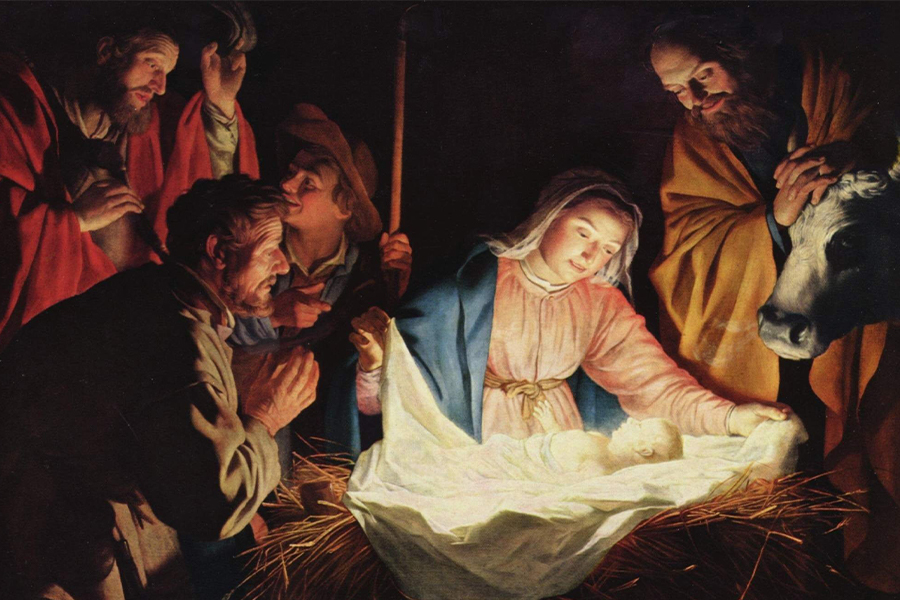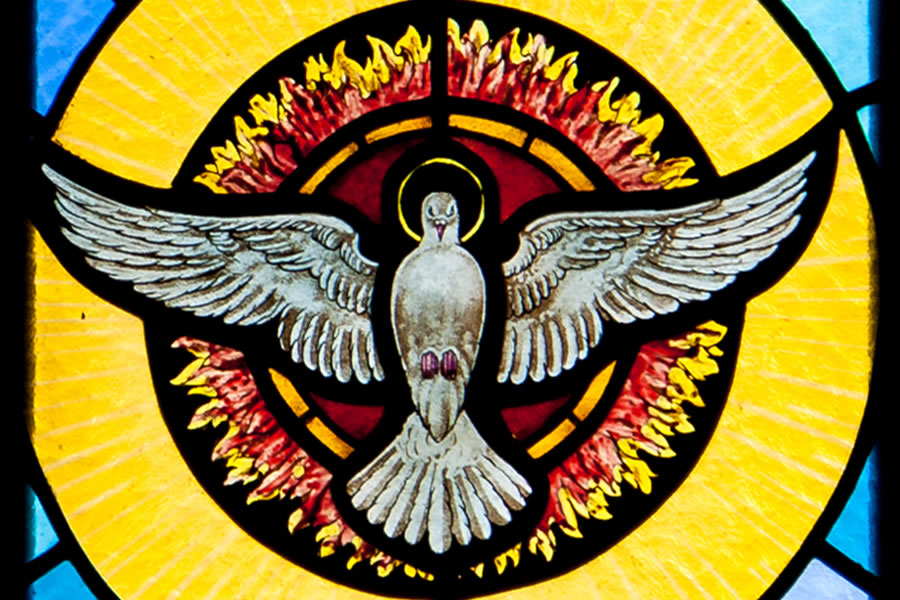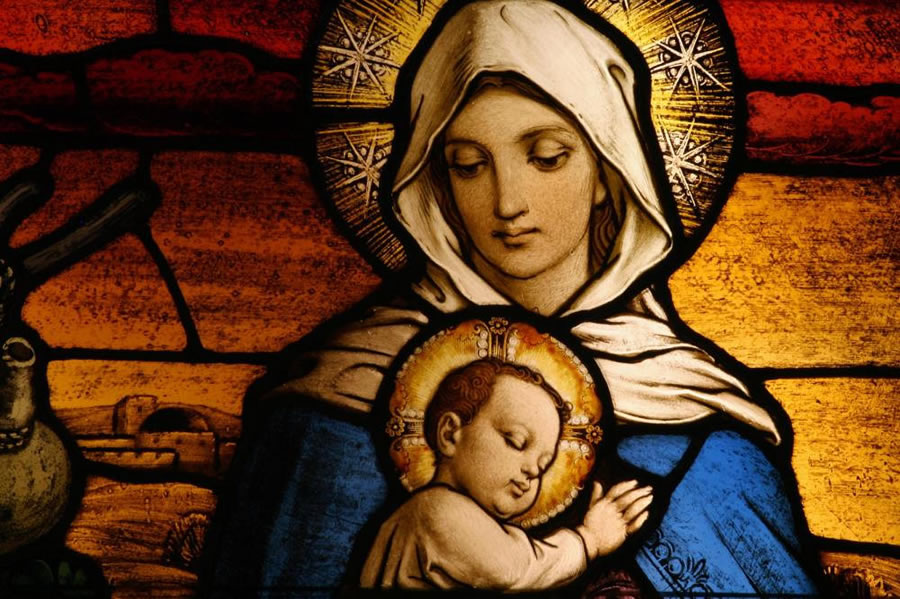St. Francis of Assisi Weekly Reflections
Respect for Elders
12-30-2018Question of the WeekReading I 1 Samuel 1:20-22, 24-28 - Samuel's birth
Reading II 1 John 3:1-2,21-24 - We are children of God
Gospel Luke 2:41-52 - The boy Jesus in the Temple
Key Passage Jesus went down with them and came to Nazareth, and was obedient to them. (Luke 2:51a)
Adults: How would you have reacted if you were Mary and Joseph finding Jesus in the Temple?
Kids: What do you think it was like for Jesus to be in the Temple for three days without his parents?
READ MORE
The Holy Family - Jesus, Mary, and Joseph
12-30-2018Weekly ReflectionWe Celebrate Worship Resource, Vol. 43, No. 3Twelve is an awkward age. An adolescent feels grown up in some ways, but is still immature in many others. The Gospel of today offers a glimpse into Jesus’ life at this age. As a devout Jewish family, Joseph and Mary make their annual pilgrimage to the temple in Jerusalem. Jesus obediently accompanies them. But in the temple, in his “Father’s house,” he is sidetracked. He stays behind to engage with the teachers and priests. When his parents finally find him, Mary tells him how worried they were and asks why he stayed behind. Jesus explains why he stayed in the temple all along. Though they do not understand his response, Mary and Joseph do not criticize or punish their son. Though he likely wanted to continue to debate with the scholars in his Father’s house, Jesus chose to obey and return with them to Nazareth. The family is able to resolve this awkward and potentially disagreeable situation by respecting each other and showing each other care and concern. To use Saint Paul’s words, they have put on “heartfelt compassion, kindness, humility, gentleness, and patience, bearing with one another and forgiving one another” (Colossians 3:12-13). They have “put on love, that is, the bond of perfection” (3:14).
How can the Holy Family be a model for your family?
READ MOREJanuary 1
12-30-2018Liturgy CornerFr. Paul Turner, © 2001 Resource Publications, Inc.January 1 is New Year’s Day to most of the world, but in the Catholic Church it is also the Solemnity of the Blessed Virgin Mary, Mother of God. This is a relatively new title for the day. Older Catholics will remember that we used to call January 1 the Feast of the Circumcision.
Circumcision may not seem like much to have a feast about. But the day commemorated an event in the life of Jesus, just as we have days for his conception, birth, presentation in the temple, baptism, transfiguration, death, and resurrection. Luke specifically mentions the circumcision of Jesus (2:21). It took place, according to the custom, on the eighth day after his birth. That is why the feast commemorating the event fell on the eighth day of Christmas. It just happened to be New Year’s Day. The same passage from Luke says Jesus then received his name. That is why the old calendar celebrated the Most Holy Name of Jesus on the Sunday between the feasts of the Circumcision and the Epiphany. (If no Sunday intervened, the feast occurred on January 2.)
READ MORE
O Little Town of Bethlehem
12-23-2018Weekly ReflectionWe Celebrate Worship Resource, Vol. 43, No. 3Too small. Too young. Too immature. God has a habit of choosing people whom others find wanting. Micah tells of an entire town, Bethlehem, that was judged “too small to be among the clans of Judah” (Micah 5:1). Though it was “O little town of Bethlehem,” God chose it for the birthplace of our Lord. After all, it was also the birthplace of David, immature himself, the youngest of Jesse’s sons, overlooked by his own father. But he became king and from his line was born the Savior of the world. No observer in Judah would have guessed that Mary and Elizabeth—one young and a virgin, the other old and thought to be barren—would be chosen to bear the Son of God and his herald. But Mary and Elizabeth accepted their roles immediately and recognized God’s work in each other. “Blessed are you among women,” Elizabeth immediately greets Mary, “and blessed is the fruit of your womb” (Luke 1:42). Blessed indeed, for as Hebrews says, “we have been consecrated through the offering of the body of Jesus Christ once for all” (Hebrews 10:10). Truly, “now his greatness shall reach to the ends of the earth” (Micah 5:3).
As we approach Christmas, can you find God’s grace in someone you’ve overlooked?
READ MOREFourth Sunday of Advent
12-23-2018Liturgy CornerFr. Paul Turner, © Resource Publications, Inc.Number of Candles: The Advent Wreath traditionally holds four candles which are lit, one at a time, on each of the four Sundays of the Advent season. Each candle represents 1,000 years. Added together, the four candles symbolize the 4,000 years that humanity waited for the world’s Savior—from Adam and Eve to Jesus, whose birth was foretold in the Old Testament. Some Advent wreath traditions also include a fifth white “Christ” candle, symbolizing purity, that is lit on Christmas Eve or Christmas Day. Many circular wreaths can incorporate a white candle by adding a pillar candle to the wreath center.
The 4th Sunday of Advent symbolizes Peace with the “Angel’s Candle” reminding us of the message of the angels: “Peace on Earth, Good Will Toward Men.”
Prayer for the fourth week of Advent: God of our longing, be with us during these final days of Advent. May we walk in the light of Your love as we await the coming of Jesus, Your Son, the One Who is and Who is to come, in Your name we pray. Amen.
READ MOREFourth Sunday of Advent
12-23-2018Question of the WeekReading I Micah 5:1-4a - Restoration through the messiah
Reading II Hebrews 10:5-10 - The second covenant
Gospel Luke 1:39-45 - The visit to Elizabeth
Key Passage Elizabeth said, “Blessed is she who believed that there would be a fulfillment of what was spoken to her by the Lord.” (Luke 1:45)
Adults: When was it hardest for you to trust in God's plan for you, as Mary did? What can help you at such times?
Kids: When is it hardest for you to obey a parent or teacher? What can help you obey with more trust?
READ MOREThird Sunday of Advent
12-16-2018Question of the WeekReading I Zephaniah 3:14-18a - Promise of a savior
Reading II Philippians 4:4-7 - Joy and peace
Gospel Luke 3:10-18 - John calls the people to justice
Key Passage Rejoice in the Lord always; again I will say,Rejoice. Let your gentleness be known to everyone. (Philippians 4:4–5)
Adults: What might John the Baptist challenge you to do differently in your life?
Kids: Do you have extras that you can share with others this week?
READ MORE
God Is Already Here!
12-16-2018Weekly ReflectionWe Celebrate Worship Resource, Vol. 43, No. 3O Come, O Come, Emmanuel...we sing during Advent, pleading for God to come to us, for “Emmanuel” means “God with us.” But today’s readings deliver a more joyful message: God is already here! “The Lord, your God, is in your midst,” we hear in the first reading, “a mighty savior” (Zephaniah 3:17). “Among you is the great and Holy One of Israel,” we sing in the responsorial psalm (Isaiah 12:6). “The Lord is near,” Paul testifies (Philippians 4:5). In the Gospel, John the Baptist attests that the one to follow is greater than he, for “he will baptize you with the Holy Spirit and fire” (Luke 3:16). As baptized Christians, we have already received the Holy Spirit. God is already with us. So we can already witness to God’s presence, and we do this through our actions. “What should we do?” John is asked three times in the Gospel. He tells inquirers to share with those in need, to treat others fairly, and to be content with what they have. Paul sums it up when he tells the Philippians to make their kindness known to all. Truly, we rejoice today. God is here, brought into our midst in our kindness to our brothers and sisters in need.
What can you do this week to bring God into the world?
READ MOREGaudete Sunday
12-16-2018Liturgy CornerFr. Paul Turner, © Resource Publications, Inc.The Third Sunday of Advent is called Gaudete (Rejoice) Sunday. The term Gaudete refers to the first word of the Entrance Antiphon, "Rejoice". Rose vestments are worn to emphasize our joy that Christmas is near. On this day we celebrate that our waiting for the birth of Jesus on Christmas day is almost over. Rose is a liturgical color that is used to signify joy, so we light the single pink candle on the third Sunday of Advent. The 3rd Sunday of Advent symbolizes Joy with the “Shepherd’s Candle” reminding us of the Joy the world experienced at the coming birth of Jesus.
December 17 marks the beginning of the O Antiphons, the seven jewels of our liturgy, dating back to the fourth century, one for each day until Christmas Eve. These antiphons address Christ with seven magnificent Messianic titles, based on the Old Testament prophecies and types of Christ. The Church recalls the variety of the ills of man before the coming of the Redeemer.
Prayer for the third week of Advent: “Incline your ear to our prayers, O Lord, and make bright the darkness of our minds by the grace of your visitation. Who lives and reigns with you in the unity of the Holy Spirit, one God, forever and ever. Amen.”
Second Sunday of Advent
12-09-2018Question of the WeekReading I Baruch 5:1-9 - Jerusalem consoled
Reading II Philippians 1:4-6, 8-11 - Gratitude and hope
Gospel Luke 3:1-6 - John the Baptist
Key Passage “John went into all the region around the Jordan, proclaiming a baptism of repentance for the forgiveness of sins.” (Luke 3:3)
Adults: In what areas of your life do you need God's forgiveness right now? What Advent practice would assist you in expressing your repentance?
Kids: What do you want to ask God to forgive you for? What can you do during Advent to show you are sorry?
READ MORE
Prepare the Way of the Lord
12-09-2018Weekly ReflectionWe Celebrate Worship Resource, Vol. 43, No. 3We are given Advent each year as a time to prepare. But the readings today remind us that it is also a time of hope and promise. Listen to the first reading: “Jerusalem, take off your robe of mourning and misery; put on the splendor of glory” (Baruch 5:1). Between this sentence and the next, Baruch used “glory” and “splendor” five times. He imagines looking over Jerusalem and seeing mountains laid low, deserts populated with trees, and the faithful streaming in. The start of John the Baptist’s ministry echoes a similar trek: the Exodus from Egypt. John went into the desert where the word of God came to him. Leaving the desert, he crossed over the Jordan River. Crossing over from slavery to freedom in the Exodus was a sign of God’s providence. Crossing over from sin to forgiveness through repentance became a sign of John’s baptism. Advent is the time to prepare. Heed Isaiah’s words, John’s words: “Prepare the way of the Lord, make straight his paths” (Luke 3:4). Let us answer this call, so that with God’s grace we can cross over from desolation to salvation.
How can you make straight the paths for Jesus’ coming?
READ MORE
Prepare Your Heart for Advent
12-02-2018Weekly ReflectionWe Celebrate Worship Resource, Vol. 43, No. 3We tend to think of Advent as a time to prepare for Christ’s coming as a baby in a manger, the “just shoot” foretold by prophets like Jeremiah in the first reading. But today’s Gospel reminds us that it is also time to prepare for a different coming of the Lord: his return at the end of time. Jesus speaks of frightful events that will occur at that time, warning his disciples to be vigilant, not to let “the anxieties of daily life” distract them (Luke 21:34). How appropriately timed, for over the next few weeks we will face countless sources of anxiety as we prepare for Christmas. These anxieties can easily overwhelm us and make it difficult, if not impossible, to prepare for Christ’s coming in any way. Let us heed what Saint Paul wrote when exhorting the Thessalonians to prepare for Christ’s return: “May the Lord make you increase and abound in love for one another and for all” (1 Thessalonians 3:12). If we increase in love for other, we prepare ourselves for Christ’s coming into the world, whether two thousand years ago, at the end of time, or right now, in our hearts.
How can you show your love for others this Advent?
READ MOREFirst Sunday of Advent
12-02-2018Question of the WeekReading I Jeremiah 33:14-16 Restoration of Jerusalem
Reading II 1 Thess. 3:12–4:2 Plea for growth in holiness
Gospel Luke 21:25-28, 34-36 Coming of the son of man
Key Passage Be alert at all times, praying that you may have the strength to escape all these things that will take place, and to stand before the Son of Man. (Luke 21:36)
Adults: What have been the strengths of your prayer life? What habit of prayer could you strengthen during this Advent season?
Kids: What prayers will you say each day and each week during Advent?
READ MORE